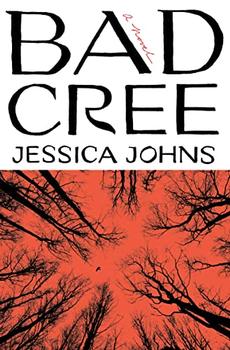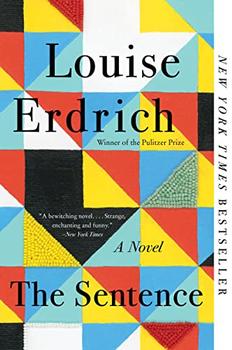Summary | Excerpt | Reading Guide | Reviews | Beyond the book | Read-Alikes | Genres & Themes | Author Bio

A Novel
by Jessica JohnsJessica Johns' debut novel Bad Cree was inspired by her desire to disprove the idea, suggested by an instructor of hers, that dreams make for boring stories. If this dismissive view is one that tends to inhabit the mainstream Western perspective, as opposed to that of Cree culture (and many others), in which dreams hold special significance, maybe this is because dreams in the dominant literary tradition are expected to serve as anecdotes, symbols or devices, rather than to exist as valid and valuable entities in themselves.
In Bad Cree, dreams are not just engaging but also essential. From the beginning of the story, it is clear that the main character, a young woman named MacKenzie, has experienced a nightmare that is not meant to simply be read as a projection of her conscious reality. Lying in bed, she clutches an object she has brought back to the waking world: a bloody crow's head. In her dream, one in a series, she saw her sister Sabrina being attacked by a crow. MacKenzie grabbed the crow and pulled its head off. The crow's head soon disappears from her hands, but the dreams persist, and MacKenzie continues to carry back objects from them, and to feel other concrete effects of her experiences there, such as pain and cold.
MacKenzie is living in Vancouver, working as a cashier at Whole Foods with her friend Joli, away from her Cree family's home in rural Alberta. As the plot unfolds, we learn that she isolated herself from her family following the death of her kokum (grandmother) years earlier, and chose not to travel back later for Sabrina's funeral. We aren't immediately given access to the facts surrounding Sabrina's death, and so as we follow MacKenzie through her struggles with the mystery of her nightmares, and her guilt for having stayed away from home for so long, we are drawn along by a desire for answers to the questions that naturally form about her past.
Bad Cree is a suspenseful thriller that provides relief from its encroaching horror in the form of MacKenzie's everyday existence: her uneventful life in Vancouver, and, later, the cozy, if disorienting, family life she left behind in her hometown of High Prairie, as she returns to her mother, aunties, cousins and surviving sister Tracey to better understand her predicament. At its heart, it is about the complicated mechanisms of grief and how these mechanisms resist the simple solutions and explanations we seek; how they resist the symbolism and meaning we try to impose on them in order to escape them. MacKenzie at first wants to believe that the dreams are simply a result of her avoiding home for so long, that her return visit will fix her guilt and mourning; but while coming back to her family proves critical in freeing herself from the web of her nightmares, it is not automatically healing in the way she wants it to be.
In its structure, pacing and ideas, Bad Cree is a substantial and well-built story; in the specifics of its prose, it sometimes loses flow, such as in its overstuffing of adverbial phrases between lines of dialogue — "'I just don't,' I say a little too firmly";"'I never thought about it,' I say carefully" — and its occasional plodding description of actions. But it thrives in playful and sharp turns of phrase — for example, of MacKenzie's Auntie Verna: "She loves throwing memory grenades and then just watching them explode."
While the culprit behind MacKenzie's dreams is eventually uncovered, and while her nightmare visions are connected to the greed and environmental devastation that the oil industry has wrought on her family's home, there is no neat tying up of her sadness over her sister's death and her general malaise. In resisting simplistic, popular ideas about dreams and symbolism, Johns also resists the horror trope in which objects or creatures of terror are presented as obvious metaphors for mental illness or trauma, existential voids that need to either be filled or excised. This is evident in the novel's refutation of different ideas of "badness." As she has long avoided her familial obligations, MacKenzie struggles with the feeling that she is a "bad Cree," but she also comes to realize that badness itself is not a singular condition or something that necessarily needs to be compensated for or repaired. At one point she muses, "It dawns on me now that sometimes the bad isn't a hole, a lack, a place where something is missing. Sometimes feeling bad is a true warning, something that could save you."
![]() This review was originally published in The BookBrowse Review in February 2023, and has been updated for the
November 2023 edition.
Click here to go to this issue.
This review was originally published in The BookBrowse Review in February 2023, and has been updated for the
November 2023 edition.
Click here to go to this issue.

If you liked Bad Cree, try these:

by J. Nicole Jones
Published 2025
A dreamy California Gothic about a woman who moves to the mysterious town of Bellinas to save her marriage, only to be swept up in a hedonistic cult that isn't what it seems

by Louise Erdrich
Published 2022
In this stunning and timely novel, Pulitzer Prize and National Book Award–winning author Louise Erdrich creates a wickedly funny ghost story, a tale of passion, of a complex marriage, and of a woman's relentless errors.
Your guide toexceptional books
BookBrowse seeks out and recommends the best in contemporary fiction and nonfiction—books that not only engage and entertain but also deepen our understanding of ourselves and the world around us.